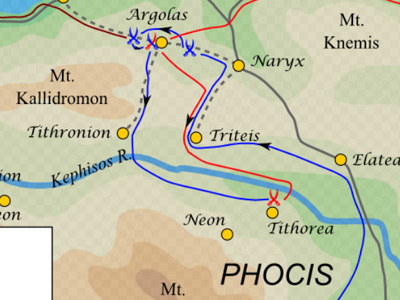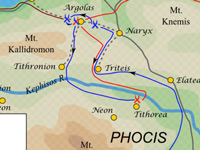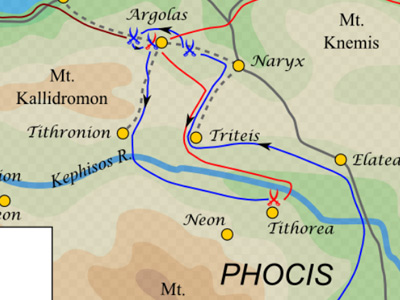Third Sacred War (356–346 BC)

The Third Sacred War (356–346 BC) was fought between the forces of the Delphic Amphictyonic League, principally represented by Thebes, and latterly by Philip II of Macedon, and the Phocians. The war was caused by a large fine imposed in 357 BC on the Phocians by the Amphictyonic League (dominated at that moment by Thebes), for the offense of cultivating sacred land; refusing to pay, the Phocians instead seized the Temple of Apollo in Delphi, and used the accumulated treasures to fund large mercenary armies. Thus, although the Phocians suffered several major defeats, they were able to continue the war for many years, until eventually all parties were nearing exhaustion. Philip II used the distraction of the other states to increase his power in northern Greece, in the process becoming ruler of Thessaly. In the end, Philip's growing power, and the exhaustion of the other states, allowed him to impose a peaceful settlement of the war, marking a major step in the rise of Macedon to pre-eminence in Ancient Greece.
Background
The war was ostensibly caused by the refusal of the Phocian Confederation to pay a fine imposed on them in 357 BC by the Amphictyonic League, a pan-Hellenic religious organisation which governed the most sacred site in Ancient Greece, the Temple of Apollo at Delphi. The fine was occasioned by the Phocians's illegal cultivation of sacred land on the Kirrhaean plain, which they did not deny; the fine was, however, far beyond the Phocians' ability to pay. Under normal circumstances, refusal to pay the fine would have made the Phocians religious (and therefore political) outcasts in Greece, and liable to have a sacred war declared against them.
Behind the religious element, there probably lay a display of realpolitik in bringing charges against the Phocians, instigated by the Thebans. The Phocians had declined to send troops on the Mantinea campaign of 362 BC, despite Theban requests, and this appears to have caused lasting enmity in Thebes. By 357 BC, with the Athenians embroiled in the Social War, and Alexander of Pherae (an erstwhile ally of the Phocians) dead, the Thebans deemed that the chance to punish Phocis had come. The Amphictyonic League was composed of 12 Greek tribes, primarily of central Greece (the Oetaeans, Boeotians, Dolopes, Phthian Achaeans, Locrians, Magnesians, Malians, Perrhaebians, Phocians, Pythians of Delphi and Thessalians), plus the Dorians (including Sparta) and the Ionians (including Athens), with each tribe having two votes in the council of the league. Thebes had effectively become the 'protector' of the league in 360 BC, after the civil war had restarted in Thessaly; the Thessalians having previously been the dominant power in the league. Thus, at this time, Thebes controlled a majority of the votes in the council, and at the autumn meeting in 357 BC, the Thebans were able to have both the Phocians (for the cultivation of the sacred land) and the Spartans (for occupying Thebes some 25 years previously) denounced and fined. Since the fines for both parties were "unjustifiably harsh", the Thebans probably expected neither party to pay, and thus to be able to declare a sacred war on either. There seems to have been some sympathy in Greece for the Phocians, since other states could see that "the Thebans...had used the Amphictyony to pursue petty and destructive vendettas".
The Phocians held a special conference to decide what action to take. Philomelos, a citizen of Ledon, advocated a pre-emptive policy of seizing Delphi (which was situated within the boundaries of Phocis), and asserting the ancient claim of Phocis to the presidency of the Amphictyonic League. In this way, the Phocians could annul the judgment against themselves. The Phocians voted in favour of his proposal, and Philomelos was appointed strategos autokrator (general with independent powers) by the confederacy, with his chief supporter Onomarchos also elected as strategos. Philomelos travelled to Sparta to discuss his proposals with the Spartan king Archidamos III. Archidamos expressed his support, hoping that the Spartan fine would also be annulled, and gave Philomelos 15 talents to raise troops with.
HISTORY

RESOURCES
This article uses material from the Wikipedia article "Third Sacred War (356–346 BC)", which is released under the Creative Commons Attribution-Share-Alike License 3.0.
© Stories Preschool. All Rights Reserved.









